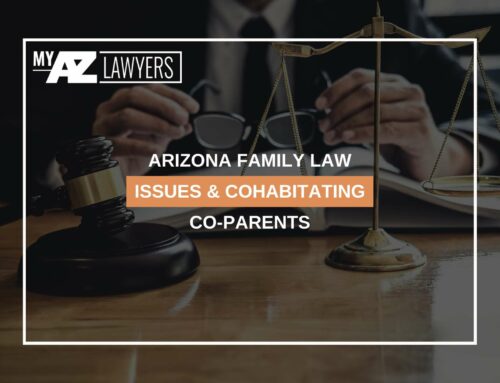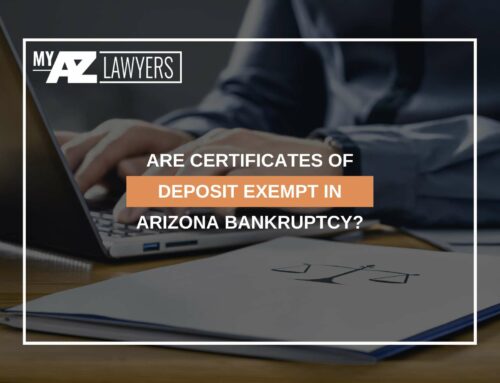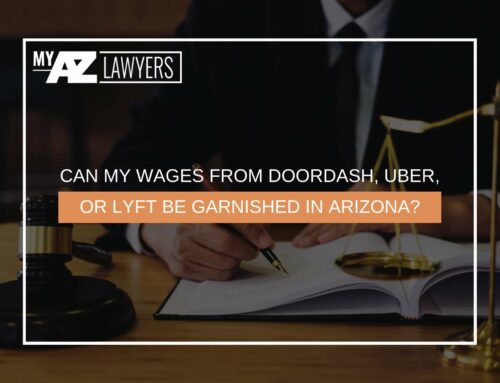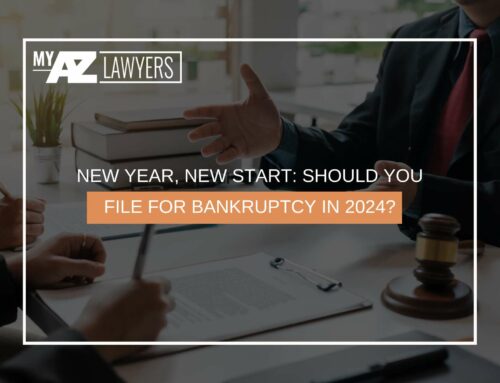Arizona Bankruptcy Or Offer In Compromise?
Debt can creep on anyone, no matter the source. But the source of the debt can impact the debtor’s best plan of action in dealing with it. Most people have heard of bankruptcy, and even if they don’t know much about it, at least know that it’s meant to help people struggling with debt. If someone is dealing specifically with debts owed to the IRS, they may have also heard of an offer in compromise. Both options can help someone in Arizona who is struggling to catch up on back taxes. Both have advantages the other doesn’t offer, but come with negative aspects as well. Read on to learn more about filing bankruptcy and an offer in compromise. For your free consultation with one of our Arizona bankruptcy lawyers, call 480-448-9800.

Offer In Compromise
An offer in compromise is used specifically to address debt owed to the IRS. As the name suggests, it is an offer to the IRS to pay back taxes- usually at a reduced, or compromised, rate. Someone who owes back taxes to the IRS can submit an application for an offer in compromise, and it will be considered based on the applicant’s income, assets, equity, and overall ability to pay. Offers in compromise can either be made in lump sums or installments. Applicants of either type will need to submit a filing fee of $205 with their applications. If applying to pay by lump sum, the applicant should submit 20% of the payment with their application. If applying to pay in installments, the applicant should submit the first proposed payment with their application.
After submitting an offer in compromise, there will be a temporary review period. Unless the applicant meets certain low-income certification guidelines, the applicant should make their payments as proposed in the meantime. If the application is submitted, the IRS may place a lien on the applicant’s property. This lien will be removed when payment for the offer in compromise is made in full.
Bankruptcy
There are several types of bankruptcy available to individuals and corporations in Arizona. The most frequently filed type in Arizona is Chapter 7 bankruptcy. Chapter 7 is also what most people envision when they think about bankruptcy. Chapter 13 bankruptcy is the second most popular type of bankruptcy. There are other types of bankruptcy available, such as Chapter 11, but these are typically only used by larger corporations with complex debt structures. When a debtor files any type of bankruptcy, they immediately are covered by what is known as “the automatic stay.”
Chapter 7 Bankruptcy
Chapter 7 bankruptcy can clear nearly limitless unsecured, nonpriority debts. A debtor must meet certain requirements to file Chapter 7, like income limitations, and waiting periods, and the debtor’s assets might not be protected by Arizona’s bankruptcy exemptions. Chapter 7 bankruptcy will usually take somewhere between 3 and 6 months to complete. The issue with using a Chapter 7 bankruptcy is that it doesn’t discharge all types of tax debts. While tax debts are usually unsecured, there are several factors that could make a debt owed to the IRS a priority debt. Any priority tax debts will remain unscathed by a Chapter 7 bankruptcy discharge. Additionally, the debtor may be bound by bankruptcy waiting periods when the tax debt is old enough to lose priority status.
Chapter 13 Bankruptcy
Chapter 13 bankruptcy reorganizes debts into four categories and pays them off in order. The third (and last mandatory) category is priority debt. This is where tax debts that would not be dischargeable in a Chapter 7 bankruptcy would be paid off in the plan. Non-priority tax debts would be paid off last in a Chapter 13 bankruptcy plan. A Chapter 13 payment plan lasts 3 years if the debtor earns less than the state median income, and 5 years if the debtor earns more than that amount. If their disposable monthly income doesn’t allow for unsecured nonpriority debts to be fully paid off in the applicable time period, those debts will be discharged at the successful completion of the payment plan.
When Is Tax Debt Priority Debt?
The decision between an offer in compromise and filing bankruptcy could hinge on whether or not your tax debt is considered an unsecured priority debt. Tax debt treatment under bankruptcy law is governed by U.S.C. §§ 507(a)(8) and 523(a)(1). The tax debt is unsecured if there is no collateral attached to the debt, and the IRS has not yet placed a lien on the debtor’s property. To be a priority debt, the tax debt needs to meet the following factors:
- The due date for the tax year, including any extensions, must be at least 3 years prior to the bankruptcy filing date.
- The tax returns must have been filed at least 2 years prior to the bankruptcy filing date.
- The tax debt was assessed at least 240 days prior to the bankruptcy filing date.
- Not a trust fund tax debt.
- Taxes on fraudulent returns or from years in which the debtor committed willful tax evasion.
If someone has previously filed bankruptcy, the priority qualifications for their tax debt will be slightly different. The due date for the taxes will be extended from 3 years to 3 years and 90 days. The 240-day rule for tax debt assessment will be increased by 180 days for a total of 420 days.
Which Is Best For My Situation?
There isn’t a cookie-cutter answer to the question between an offer in compromise and bankruptcy. Which is best for you could depend on how much debt you have besides tax debt, whether you would file Chapter 7 or Chapter 13, and more. A Phoenix bankruptcy attorney can help you review your situation and which issues could be relevant under both options.
There are a few specific situations where an offer in compromise could be the better option for you because of a specific applicable bankruptcy restriction. For example, bankruptcy can only discharge income taxes. If you owe a different type of tax debt, such as payroll taxes, an offer in compromise can provide relief that wouldn’t be available in bankruptcy.
What Happens If I File Bankruptcy After The IRS Accepts My Offer In Compromise?
Bankruptcy nullifies several types of payment contracts, but not offers in compromise made to the IRS. A debtor who has made an offer in compromise to the IRS should continue their payments as planned despite the bankruptcy.
It is important to note that if the debtor has filed an offer in compromise, their tax debt will be treated slightly differently in bankruptcy. The 240-day rule for tax debt assessment will be increased by 30 days to a total of 270 days.
Experienced Bankruptcy Attorneys For Tax Debt Considerations & More
If you owe back taxes to the IRS, along with other types of debts to different creditors, you don’t need to jump into bankruptcy or an offer in compromise without careful consideration. My AZ Lawyers offers free consultations so that you can make your decision fully informed and confident. If you decide to retain, we offer affordable payment plans that start after your case has been filed. To get started with your free consultation, contact us at 480-448-9800.
Arizona Offices:
Mesa Location:
1731 West Baseline Rd., Suite #100
Mesa, AZ 85202
Office: (480) 448-9800
Email: info@myazlawyers.com
Website: https://myazlawyers.com/
Phoenix Location:
343 West Roosevelt, Suite #100
Phoenix, AZ 85003
Office: (602) 609-7000
Glendale Location:
20325 N 51st Avenue Suite #134, Building 5
Glendale, AZ 85308
Office: (602) 509-0955
Tucson Location:
2 East Congress St., Suite #900-6A
Tucson, AZ 85701
Office: (520) 441-1450
Avondale Location:
12725 W. Indian School Rd., Ste E, #101
Avondale, AZ 85392
Office: (623) 469-6603














